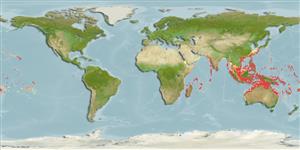Common names from other countries
>
Acanthuriformes (Surgeonfishes) >
Acanthuridae (Surgeonfishes, tangs, unicornfishes) > Acanthurinae
Etymology: Acanthurus: Greek, akantha = thorn + Greek, oura = tail (Ref. 45335).
More on author: Cuvier.
Environment: milieu / climate zone / depth range / distribution range
Οικολογία
Θαλασσινό(ά) Υφαλόφιλο(α); εύρος βάθους 5 - 100 m (Ref. 28016), usually 5 - 45 m (Ref. 27115). Tropical; 23°C - 28°C (Ref. 27115); 35°N - 35°S, 30°E - 137°W
Indo-Pacific: Red Sea south to Natal, South Africa and east to the Marquesas and Tuamoto islands, north to southern Japan, south to the southern Great Barrier Reef and New Caledonia.
Μέγεθος / Βάρος / Age
Maturity: Lm ? range ? - ? cm
Max length : 50.0 cm TL αρσενικό/απροσδιόριστο; (Ref. 3145); μεγ. αναφερόμενη ηλικία: 23 έτη (Ref. 52229)
Ραχιαίες άκανθες (συνολικά) : 9; Μαλακές ραχιαίες ακτίνες (συνολικά) : 24 - 26; Εδρικές άκανθες: 3; Μαλακές εδρικές ακτίνες: 23 - 24. This species is distinguished by the following characters: body moderately deep and compressed, its depth 2.1-2.5 times in standard length or SL (smaller individuals are deeper-bodied); snout relatively short, 6-6.9 times in SL; eye 3.2-4.5 times in head length (at 12-28 cm SL); mouth small; teeth spatulate, close-set, with denticulate edges, and small for the genus; total gill rakers on first gill arch 13-15; continuous, unnotched dorsal fin IX,24-26; A III,23-24; caudal fin emarginate to lunate, concavity 6.5-9 times in SL (concavity is greater in larger individuals); caudal peduncle narrow, the least depth 10-12 times in SL with a lancet-like spine on each side which folds into a deep horizontal groove; stomach large, U-shaped, thin-walled with large, thorn-like papillae on inner surface; colour brown with longitudinal blue lines on head and body; a yellow area behind eye and 2 yellow bands extending anteriorly from eye; when alive, this fish is capable of changing its ground colour from dark brown to pale blue (Ref. 9808).
Adults inhabit steep slopes, often in turbid waters, generally in the vicinity of coral reefs (Ref. 58652) or rocky bottoms. They form resident spawning aggregations (Ref. 27825, 48637). Adults often seen in schools, feeding mid-water on plankton (Ref. 48637). Feed on zooplankton. Marketed fresh. Flesh is almost never poisonous (Ref. 4795), but incidence of ciguatera poisoning was reported from Nauru I. (Ref. 125620). The retractile sharp blades of the caudal peduncle can be dangerous (https://www.monaconatureencyclopedia.com/acanthurus-mata-2/?lang=en, ver. 12/2021)
Life cycle and mating behavior
Maturities | Αναπαραγωγή | Spawnings | Egg(s) | Fecundities | Προνύμφες
Form resident spawning aggregations (Ref. 27825).
Randall, J.E., 1987. Three nomenclatorial changes in Indo-Pacific surgeonfishes (Acanthurinae). Pac. Sci. 41(1-4):54-61. (Ref. 1921)
IUCN Red List Status (Ref. 130435)
CITES (Ref. 128078)
Not Evaluated
Threat to humans
Traumatogenic (Ref. 4716)
Human uses
αλιεία: Εμπορικό(ά); Ενυδρείο: Εμπορικό(ά)
Εργαλεία
Special reports
Download XML
Διαδικτυακές πηγές
Estimates based on models
Preferred temperature (Ref.
115969): 24.7 - 29, mean 27.9 (based on 1918 cells).
Phylogenetic diversity index (Ref.
82804): PD
50 = 0.5000 [Uniqueness, from 0.5 = low to 2.0 = high].
Bayesian length-weight: a=0.02630 (0.01714 - 0.04036), b=2.94 (2.82 - 3.06), in cm Total Length, based on LWR estimates for this species & Genus-body shape (Ref.
93245).
Τροφικό Επίπεδο (Ref.
69278): 2.5 ±0.25 se; based on food items.
Ελαστικότητα (Ref.
120179): Χαμηλό, ελάχιστος χρόνος για διπλασιασμό πληθυσμού 4,5 - 14 έτη (K=0.219; tmax=23).
Fishing Vulnerability (Ref.
59153): Moderate vulnerability (39 of 100).
